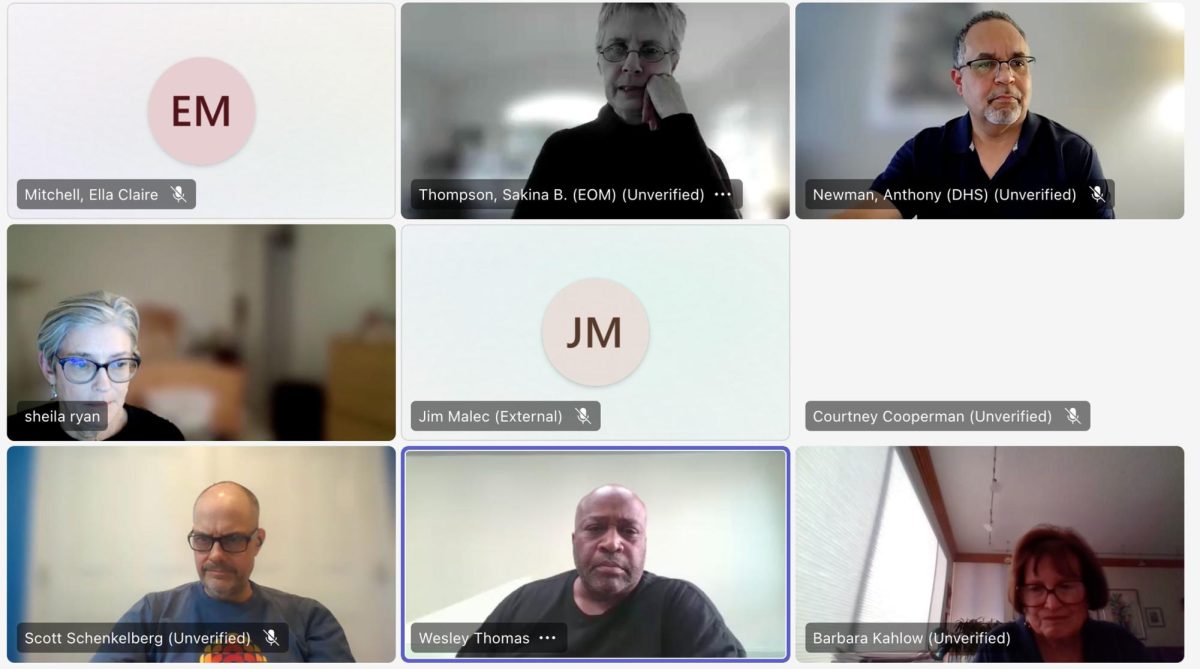The Community Advisory Team pushed back voting on a tenant-neighbor agreement for an unhoused shelter slated to open next month after some community members reported struggling to access the virtual link for the public meeting.
CAT officials said they will hear feedback from community members on the Good Neighbor Agreement — a document that outlines the shared goals and responsibility of residents living in The Aston unhoused shelter and the building’s neighbors — via Zoom on Sept. 23, make final edits to the document by Sept. 27 and vote on the agreement on Oct. 7 — a week after tenants are expected to begin moving in. Officials initially slated the vote for Sept. 27, but many members of the public were unable to join and share their thoughts on the agreement because the Zoom link for the meeting did not work.
CAT members solicited initial in-person feedback for the Good Neighbor Agreement on Sept. 5, which devolved into local residents asking questions about the incoming tenants, their anticipated cleanliness and security at The Aston. CAT members discussed feedback from the Sept. 5 meeting and answered outstanding questions on Monday.
Jean-Michel Giraud — the president and chief executive officer of Friendship Place, The Aston’s provider — clarified that there will be an 11 p.m. curfew for tenants living in the unhoused shelter, after community members asked whether the residents would use public spaces in the neighborhood like grocery stores and libraries. He said the curfew is not strict, and officials will make sure residents are able to work and access the resources they need.
“It’s a reference with a lot of flexibility,” Giraud said. “We don’t use a disciplinary approach, especially with people who are rebuilding their lives.”
Giraud said the curfew allows tenants to settle into daily life while ensuring people are not consistently returning to their rooms in the middle of the night.
“What I like people in the community to understand is that we are not holding these folks to a higher standard because they are living in homelessness,” Giraud said. “It doesn’t mean that they have to somehow earn their way through these programs. Rather we use a compassionate and supportive approach.”
CAT co-chair Jim Malec said he wanted community members to understand the purpose of the rules for The Aston, which Department of Human Services officials said would be released in the coming weeks.
“This curfew is in place for the benefit of the participants and for the benefit of the program, not because there is a perceived security concern or for the benefit of the community,” Malec said.
DHS Deputy Administrator Anthony Newman said drugs and alcohol are not permitted at the shelter, including medical marijuana. When a meeting participant asked if the ban would encourage people to smoke directly in front of The Aston, which could harm neighbors, Newman said this hasn’t been an issue at other facilities.
“There’s no evidence yet to suggest that not allowing clients to possess or use medical marijuana is driving people to do it outside,” Newman said. “We have not seen that connection.”
Giraud said officials will provide neighbors with opportunities to volunteer at The Aston, because he believes community engagement is crucial for building a community and giving the tenants a sense of belonging.
“It’s important to have these ties with neighbors,” he said.
Newman said officials are still working to schedule a date for The Aston’s open house, which he said will likely take place at the beginning of October, a few days before the tenants move in.
“A lot of people want to see the building before the first night, including members of the public,” Newman said. “At this point, that is still our plan to make sure everyone gets that opportunity.”
Newman also said providers have begun filling out referrals for clients, and case managers are contacting DHS about The Aston’s bridge housing program.
“Case managers are sending in clients through our referral process,” Newman said. “We are getting a sense of the number of people who are interested in this program, and I can assure you, it is robust. There are a lot of clients who are looking forward to this building’s opening.”
Mark Cohen, a West End community member and retired physician, asked if there will be a way for neighbors to file nonemergency complaints or concerns about The Aston once it opens.
Interim CAT co-chair Sakina Thompson said the protocol and resources to file nonemergency concerns will be outlined in the final version of The Good Neighbor Agreement.
CAT team members clarified language within the Good Neighbor Agreement document and agreed to add a glossary, per ANC Chair Chris Labas’ suggestion at the public CAT meeting last week.
“It’s a tight timeline, but we need to get this done,” Malec said.





